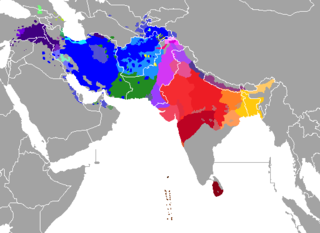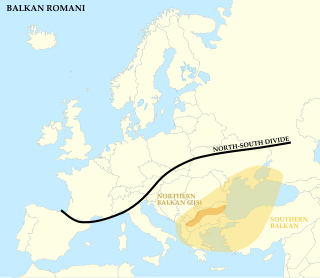Related Research Articles

The Indo-Iranian languages constitute the largest and southeasternmost extant branch of the Indo-European language family. They include over 300 languages, spoken by around 1.5 billion speakers, predominantly in South Asia, West Asia and parts of Central Asia, comprising the modern-day countries of India, Pakistan, Bangladesh, Iran, Afghanistan, Nepal, Sri Lanka, Tajikistan, Maldives and the adjacent regions of neighbouring countries.
Stephen Matthews is a British linguist in Hong Kong. He is Co-Director of the Childhood Bilingualism Research Centre at the Chinese University of Hong Kong. His specialist areas include language typology, syntax and semantics. His current interests include the word order typology of Chinese; the grammar of Chinese languages, notably Cantonese, Chaozhou and other Minnan dialects; language contact and bilingualism, with particular reference to Sinitic languages.
Salikoko Mufwene is a linguist born in Mbaya-Lareme in the Democratic Republic of the Congo. He is the Edward Carson Waller Distinguished Service Professor of linguistics at the University of Chicago. Mufwene was elected to the American Philosophical Society in 2022.
The Pangloss Collection is a digital library whose objective is to store and facilitate access to audio recordings in endangered languages of the world. Developed by the LACITO centre of CNRS in Paris, the collection provides free online access to documents of connected, spontaneous speech, in otherwise little-documented languages of all continents.
Virginia Yip (葉彩燕), is a Hong Kong linguist and writer. She is director of the Childhood Bilingualism Research Centre. She is a professor at the Chinese University of Hong Kong. Her research interests include bilingual language acquisition, second language acquisition, Cantonese, Chaozhou and comparative Sinitic grammar, psycholinguistics, and cognitive science.

Hristo (Slavov) Kyuchukov or Christo Slavov Kütchukov is a German Muslim Rom, born in Bulgaria. He is a leading specialist in the field of Romani language and education of Roma children in Europe.
Rena Torres Cacoullos is an American linguist known for her work on language variation and change, as well as her research on processes of grammaticalization and the linguistic outcomes of language contact. She is currently Professor of Spanish Linguistics in the Department of Spanish, Italian, and Portuguese at the Pennsylvania State University.
Elena Marushiakova is a historian and ethnographer working in field of Romani Studies, of Slovak and Russian origin, who has lived and studied in Slovakia and Bulgaria. In 2016 she became a Research Professor in the School of History at the University of St Andrews. Elena Marushiakova became the president of the Gypsy Lore Society.
Sepečides Romani, also known as Sevlengere Roma, is the Romani dialect of the traditionally basketweaving Roma originally from Thessaloniki. Their ancestors lived there as nomads during the Ottoman Empire until the population exchange between Greece and Turkey. The Sepečides dialect is considered to be non-Vlach. It belongs to the Southern Balkan group of Romani dialects, although the RomArchive claims the language is practically extinct.
Mena B. Lafkioui is a linguist specializing in Berber languages. She is currently Research Director at the French National Centre for Scientific Research and Professor of Berber Linguistics at the School for Advanced Studies in the Social Sciences.
Ans van Kemenade is a Dutch professor of English linguistics at the Radboud University Nijmegen specializing in the history of the English language.

Rumelian Romani is a dialect of Southern Romani of strong Turkish pronunciation with Turkish and Greek loanwords, once was spoken by the Turkish-Muslim Roma (Xoraxane) in Ottoman Rumelia, especially by the Sedentary Rumelian Romani people of various groups in Edirne in East Thrace First described by Evliya Çelebi's Seyahatname in 1668, of the Muslim Roma in Gümülcine, and later by William Marsden in 1785 and by Alexandros Georgios Paspatis (Paspati), a scholar of the Romani language in 1870. The Greek Doctor A. G. Paspati made also the statemant in his Book, that Turks married often Roma Woman. This Romani dialect is almost extinct in Turkey, but still spoken by Muslim Roma in Western Thrace today.

Annick De Houwer is a Belgian linguist, academic, researcher and author. She is the Initiator and Director of the Harmonious Bilingualism Network (HaBilNet).
Maria D. Aloni is an Italian logician and philosopher of language, interested in formal semantics and the development of forms of logic that can capture the deviations of human reasoning from classical logic. She is an associate professor in the University of Amsterdam Faculty of Humanities, affiliated there with the Department of Philosophy and the Institute for Logic, Language and Computation.
Mira Ariel is a professor of linguistics at Tel Aviv University, specializing in pragmatics. A pioneer of the study of information structure, she is best known for creating and developing Accessibility Theory.
Krzysztof R. Apt is a Polish computer scientist. He defended his PhD in mathematical logic in Warsaw, Poland in 1974. His research interests include program correctness and semantics, use of logic as a programming language, distributed computing, and game theory. Besides his own research, he has been heavily involved in service to the computing community, notably by promoting the use of logic in computer science and by advocating open access to scientific literature.

Isabelle Bril is a senior researcher at the French National Centre for Scientific Research and a member of LACITO specializing in morphosyntax, semantics, typology, and Austronesian languages.
Martine Vanhove is a French linguist, Research Director emerita at LLACAN (CNRS), specializing in Cushitic and Semitic languages spoken in Djibouti, Yemen and Malta.

Anna Giacalone Ramat, born Anna Giacalone in Forlì, Italy, 17 June 1937, is an Italian linguist known for her work on grammaticalization and language acquisition.
Tania Kuteva is a historical linguist specializing in grammaticalization, language contact and discourse grammar.
References
- 1 2 "Abralin Ao Vivo: Evangelia Adamou" . Retrieved 25 July 2022.
- ↑ "Evangelia ADAMOU". LACITO. Retrieved 2022-10-13.
- ↑ "Academia Europaea: Evangelia Adamou CV" . Retrieved 25 July 2022.
- 1 2 3 "Academia Europaea: Evangelia Adamou" . Retrieved 25 July 2022.
- ↑ "Adamou, Evangelia - Persée". www.persee.fr. Retrieved 2022-10-13.
- ↑ "Evangelia Adamou". scholar.google.fr. Retrieved 2022-10-13.